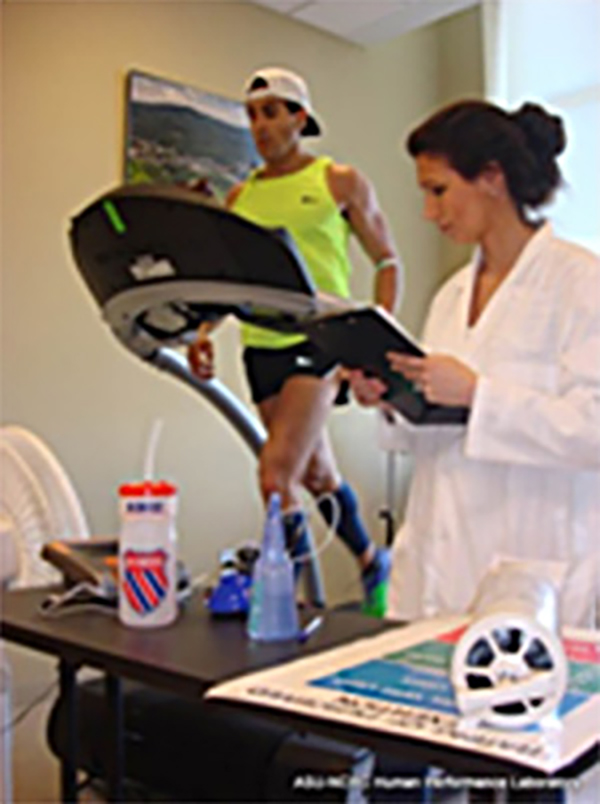
Researchers have found that greater than normal depletion of muscle glycogen following intense running hinders athletes’ post-race recovery. The findings were released by researchers from Appalachian State University Human Performance Lab on the NC Research Campus (NCRC) in Kannapolis. Researchers further said switching to cross training may help. Pictured are runner Phillip Ciccarello from Charlotte and Caitlin Worley Rankin, a former Human Performance Lab intern from UNC Charlotte. Photo submitted
KANNAPOLIS—David Nieman, DrPH, with the Appalachian State University Human Performance Lab on the NC Research Campus (NCRC) in Kannapolis, gets a steady stream of emails from runners who find themselves unable to recover from intense exercise like marathons after years of training and competing.
His most recent study, “Post-exercise skeletal muscle glycogen related to plasma cytokines and muscle IL-6 protein content, but not muscle cytokine mRNA expression,” published in Frontiers of Nutrition, illustrates how greater than normal depletion of muscle glycogen following intensive exercise may be one reason why.
“If runners’ inflammation levels are thrown up and down on a daily basis, it could be as bad as being systemically inflamed like we see in people with obesity and type 2 diabetes,” Nieman explained. “This study helps us to better understand why some people experience high levels of inflammation during exercise and some don’t. For the people who use up all of their glycogen stores while running, perhaps they are not genetically endowed to be runners.”
Immune Response to Running
Nieman’s findings came after collecting muscle biopsies from 24 male runners before and after they ran to exhaustion. He found that as muscle glycogen stores were depleted the runners’ muscles secreted pro-inflammatory cytokines into the blood. The release of cytokines was highest among the athletes experiencing the greatest loss of muscle glycogen.
“The immune system reflects the stress the body goes through during long-distance running,” Nieman said. “After every long run, the immune system is heavily occupied with repairing muscle damage. Stress hormones increase as glycogen levels decrease, contributing to transient inflammation and immune dysfunction.”
Mix It Up to Improve Recovery
Nieman finds the inflammation and immune dysfunction caused by the continued depletion of muscle glycogen stores plagues some runners for years. Nieman, who has run 58 marathons, suggests that athletes consume carbohydrates during exercise to keep glycogen levels healthy.
“We have previously shown that any sports nutrition product or food such as bananas during exercise appears to counter the effect of glycogen depletion on inflammation,” he commented.
He recommends cross training by alternating running with cycling, swimming or weight lifting to counter the stress of running. A 2013 study that Nieman’s laboratory conducted found cyclists experience less muscle damage, soreness and inflammation than runners after completing the same amount of exercise.
“Running is a very stressful exercise on the body,” Nieman noted. “The more you mix it up, the better, especially for athletes who have concerns about recovery, illness and maintaining their competitive edge.”
About Appalachian State University
As a premier public institution, Appalachian State University prepares students to lead purposeful lives. App State is one of 17 campuses in the University of North Carolina System, with a national reputation for innovative teaching and opening access to a high-quality, cost-effective education. The university enrolls more than 21,000 students, has a low student-to-faculty ratio and offers more than 150 undergraduate and 80 graduate majors at its Boone and Hickory campuses and through App State Online. Learn more at https://www.appstate.edu.
What do you think?
Share your feedback on this story.











